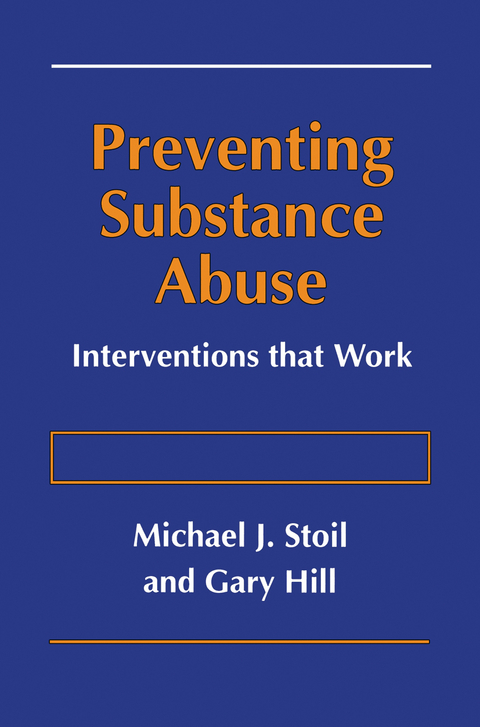
Preventing Substance Abuse
Kluwer Academic/Plenum Publishers (Verlag)
978-0-306-45455-4 (ISBN)
1. A Problem-Solution Approach to Substance Abuse.- Substance Abuse: A Constellation of Problems.- How Communities Respond.- Doing What Works: Reducing Specific Problems.- Doing What Works: Finding Winning Solutions.- Doing What Works: The Changing Role of Primary Healthcare.- 2. Problem: Preventing Drug-Exposed Newborns.- Drug-Exposed Newborns as a Community Problem.- Delaware Diamond Deliveries.- New Start, Oregon.- Project Network, Oregon.- National Indian Fetal Alcohol Syndrome Prevention (Multiple States).- General Observations.- 3. Problem: Prevention among Families in Trouble.- Families that Need—and Elude—Help.- Family Effectiveness Training, Florida.- Strengthening Black Families, Alabama.- Survival Training for Parents, Ohio.- YCOSA Targeted Prevention, Alabama.- General Observations.- 4. Problem: Prevention among Young Children.- What Kinds of Intervention Can Young Children Use?.- “I’m Special” Program, North Carolina.- Primary Prevention Impact for Caregivers, Florida.- Prime Time, Texas.- Social Development Project, Washington.- General Observations.- 5. Problem: Preparing the Ground for Prevention in Early Adolescence.- The Complexity of the 5th to 7th Grade Crisis.- Drug Abuse Resistance Education (Multistate).- Adolescent Alcohol Prevention Trial, California.- Alcohol Misuse Prevention Study, Michigan.- General Observations.- 6. Problem: Preventing Drug Use in Secondary School.- What School-Based Prevention Can (and Can’t) Accomplish.- Botvin’s Life Skills Approach, New York.- Drug Resistance Project, Arizona.- Lions Quest Skills for Adolescents, Ohio.- Positive Youth Development Program, Connecticut.- Project Alert, California.- Project Pride, Pennsylvania.- Teenage Health Teaching Modules (Multistate).- General Observations.- 7. Problem:Intervening with Teenagers at Highest Risk for Addiction.- “Intervention” Rather Than Prevention or Treatment.- Choice Intervention, Kentucky.- Drug Prevention Project for Homeless and Runaway Youth, Connecticut.- Everyday Theater Summer Program, Washington, DC.- Friendly PEERsuasion (Multiple Sites).- Peer Support Retreats, Arizona.- Personal Growth Class, Washington.- Project Healthy Alternatives for Life’s Transitions, Nebraska.- Residential Student Assistance Program, New York.- Smart Leaders (Multistate).- General Observations.- 8. Problem: Preventing Substance Abuse among Employees and Retirees.- Barriers to Adult Prevention.- Aetna HAI Managed Behavioral Health, Utah.- Levi-Strauss Worksite Policy Changes, Tennessee.- Los Angeles Water and Power Supervisory Training Program, California.- Mental Health and Aging Workshops, Oregon.- General Observations.- 9. Problem: Reducing the Costs of Alcohol Use.- Behind the Myth of an Alcoholic Society.- Alcohol, Drugs, Driving, and You, Colorado.- Alcoholic Beverage Server Intervention (Multistate).- Community Alcohol Abuse and Injury Prevention Project, Rhode Island.- Ignition Interlock Device Trial, Ohio.- Self-Regulation Training, Vermont.- Teams—Games— Tournaments, Georgia.- University Student Alcohol Intervention, Washington.- General Observations.- 10. Problem: Organizing the Community for Prevention.- Selecting a Model for Prevention Infrastructure.- Specialization by Client Type: The Cadre Project, California.- Specialization by Function: Greater Alliance for Prevention System, Illinois.- Top-Down Planning: Midwest Prevention Program/Project Star.- Low-Tech Linkages: Upper Little Caillou Drug-Free School, Louisiana.- General Observations.- 11. A Short “To Do” List for Drug Abuse Prevention.- BasePrevention Priorities on Need.- Match Interventions with Populations.- Inventory What’s in Place.- Invest Money and Expertise.- Call the Doctor.- Patiently Measure Success.- 12. What Doesn’t Work: Four Mistakes Preventionists Make.- How We Know What Doesn’t Work.- The Self-Esteem Trap.- Activities for the Sake of Activities.- Knowledge Isn’t Always Power.- When Drug Abuse Is Logical.- Appendix: The National Structured Evaluation on Prevention of Alcohol and Drug Abuse.- References.
| Zusatzinfo | XIV, 200 p. |
|---|---|
| Verlagsort | New York |
| Sprache | englisch |
| Maße | 155 x 235 mm |
| Themenwelt | Geisteswissenschaften ► Psychologie ► Sozialpsychologie |
| Studium ► Querschnittsbereiche ► Epidemiologie / Med. Biometrie | |
| Studium ► Querschnittsbereiche ► Prävention / Gesundheitsförderung | |
| Sozialwissenschaften ► Soziologie | |
| ISBN-10 | 0-306-45455-6 / 0306454556 |
| ISBN-13 | 978-0-306-45455-4 / 9780306454554 |
| Zustand | Neuware |
| Haben Sie eine Frage zum Produkt? |
aus dem Bereich


